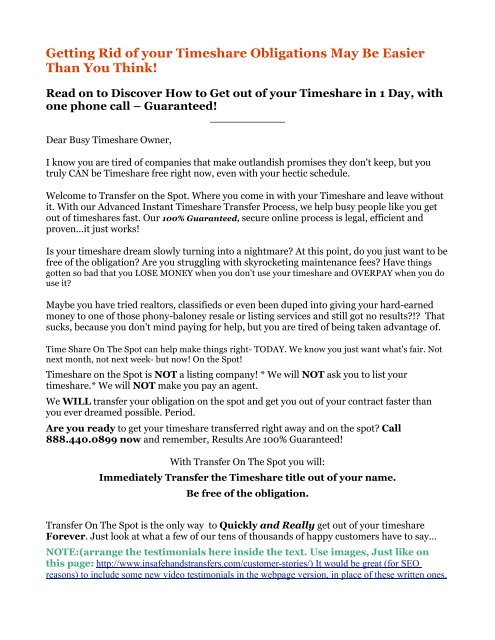Expenses that are related to fractional ownership home consist of things like upkeep and repairs/replacements, residential or commercial property management, property insurance coverage expenses, HOA charges, accounting, and tax preparation. Many of these expenses are rolled into one annual cost, for which each fractional owner is accountable. One-off expenses like a brand-new roofing or replacement of a damaged device are dealt with and assigned to owners as they occur. There is much flexibility with fractional ownership realty. The guidelines are determined, not by a corporate governing body, however by the owners themselves. As such, owners can pick to utilize their fractional ownership in a variety of ways.
If a year passes and they will not be able to getaway, they may rent out all of their weeks. how much does a blue green timeshare cost. They might sell one or all of their shares at any time. Finally, fractional ownership is real ownership. If for any factor the owners all choose to offer, each owner gets a portion of the earnings. It's a true realty possession. There are a number of different kinds of timeshare. The most typical type is "undeeded." That is, the timeshare individual doesn't own any part of the residential or commercial property. The timeshare contract just grants rights to utilize of the property for a pre-determined length of time.
The blocks of time remain in weeks. There may be as numerous as 51 other timeshare interests in one residential or commercial property, with one week assigned to each participant (how do you legally get out of a timeshare). You typically have alternatives for which week you can use the residential or commercial property. Sometimes, the timeshare corporation may provide several properties, possibly in different countries. For circumstances, your timeshare buy-in may entitle you to an option among a condominium in Florida, a vacation home in France or a high-end hotel in Ecuador. If you have enough shares and that week is readily available, you may be able to stay in your choice of lodging throughout your week.
There's generally an annual cost that you need to pay on top of what you paid for your right of use week(s). The charge can be up of $2500, depending upon the private timeshare. This charge approaches residential or commercial property management, taxes and repairs, and maintenance. Also, most timeshares charge a daily usage fee. Currently, this cost ranges in between $30 and $60 per day of use during your week, but again it depends on the timeshare business and where you stay. This is on top of your initial buy-in, as well. If you don't utilize your reserved week for some reason, many timeshares still hold you accountable for paying the everyday usage cost for your week. Points-based deeded ownerships give owners more alternatives outside of their specific week, system and resort place. These clubs award indicate owners for the homes that they own. Each home within the Club's collection of resorts have a level of desirability and value. an avarege how much do you pay for timeshare in hawaii per month. And within each residential or commercial property, particular weeks are preferred than others, and hence cost more in points to reserve. Below you can see the variety of points needed to make a reservation for a particular unit size: Platinum Weeks 22-42 & 51-52 System Size Mon-Thurs Fri-Sun Full Week Per Night Per Night Per Week Studio/ Studio Plus 350Â 700Â 3500 1 Bed Room 480Â 960Â 4800 1 Bed Room Plus 620Â 1240Â 6200 2 Bed Room 700Â 1400Â 7000 2 Bedroom Plus 840Â 1680Â 8400 2 Bed Room Plus Premier 960Â 1920Â 9600 3 Bed Room 840Â 1680Â 8400 3 Bed Room Plus 960Â 1920Â 9600 Gold Weeks 1-21 & 43-50 System Size Mon-Thurs Fri-Sun Full Week Per Night Per Night Weekly Studio/ Studio Plus 250Â 500Â 2500 1 Bedroom 340Â 680Â 3400 1 Click to find out more Bedroom Plus 420Â 840Â 4200 2 Bed Room 500Â 1000Â 5000 2 Bed Room Plus 580Â 1160Â 5800 2 Bed Room Plus Premier 700Â 1400Â 7000 3 Bedroom 580Â 1160Â 5800 3 Bed Room Plus 700Â 1400Â 7000 As soon as you end up being an owner, you can utilize your points to book appointments at any Learn more here resort within your Club's collection of resorts.

The Buzz on An Avarege How Much Do You Pay For Timeshare In Hawaii Per Month
Each club has various guidelines about when and how you can reserve trips but the one commonness is that each gives owners a home appointment duration in which they are ensured their home resort. As soon as their house booking window is over, their ownership is essentially become points that can be used in other places, typically referred to as Club Usage Period, or Club Reservation Window. There is a big quantity of versatility with this style of timeshare club and a number of the timeshare brands are approaching the instructions of a points-based system. Floating week ownerships provide some flexibility to owners within their home week reservation period.
Marriott Getaway Club is a perfect example of this type of deeded ownership. Prior to the switch to Destinations Points, Marriott offered, what have now become referred to as, 'Legacy Weeks.' These Tradition Weeks were deeded ownerships with drifting weeks that might be booked within your ownership season. There are still timing limitations and booking periods like other clubs. Floating weeks provide owners a little bit more versatility outright without having to wait until the weeks appear to everyone else. Right-to-use ownerships are different than https://johnnywslj963.bcz.com/2022/01/06/all-about-how-to-transfer-ownership-of-wyndham-timeshare/ deeded ownerships because they feature an expiration date whereas deeded timeshare ownerships are continuous and do not expire.